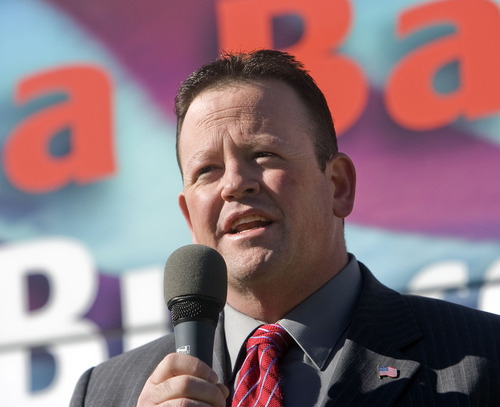This is an archived article that was published on sltrib.com in 2011, and information in the article may be outdated. It is provided only for personal research purposes and may not be reprinted.
Lt. Gov. Greg Bell cautioned lawmakers Wednesday that they cannot raise money during the legislative session for any political campaign, including congressional or county races, forcing some state lawmakers to contemplate leaving the Legislature to run for office.
"I am seriously considering resigning from the Legislature," said Rep. Carl Wimmer, R-Herriman, who is running in the new 4th Congressional District. "I'm not sure I'm willing to take a 45-day hiatus from raising money."
Bell said his office received several inquiries from legislators asking whether a state law prohibiting campaign contributions to legislators during the 45-day legislative session beginning in January would also prevent them from raising money if they were running for any other offices.
"Our office interprets this prohibition to apply to contributions to any campaign for any office for which a legislator may be a candidate," Bell wrote. "A legislator is always a legislator, regardless of any other office for which he or she may be campaigning."
It is a class A misdemeanor for donors — but not legislators — to violate the ban.
The blackout on fundraising comes at a crucial time for candidates. The last day of the 2012 legislative session is March 8. Candidates have to file for office a week later, and the parties are scheduled to hold their caucus meetings at about the same time — Democrats on March 13, Republicans on March 15.
Both parties will hold their state conventions on April 21.
Several lawmakers eyeing bids for other offices next year said the ban plays into their decision-making and could spur them to resign from the Legislature before the 2012 session begins Jan. 23.
Wimmer said leaving the Legislature would be a hard choice, since he already has legislation being drafted that he considers to be important, most notably a constitutional amendment limiting state spending.
"I kind of have to weigh the fiscal fights here versus the downside of not being able to raise money," Wimmer said.
The prohibition on fundraising already created headaches for Wimmer, who had to cancel a "very substantial" fundraiser when the special legislative redistricting session dragged on weeks longer than anticipated.
State Sen. Dan Liljenquist, R-Bountiful, who is exploring a challenge to U.S. Sen. Orrin Hatch, said he agrees with Bell's interpretation.
"You should not be raising campaign funds when you are actively participating in legislation," he said. "Should I make the decision to get into the race, fundraising will be very important and it will be difficult to do both, so I will have to make a choice: Do I fundraise or do I serve?"
Mark Thomas, Bell's deputy chief of staff, said the office consulted with the Attorney General's Office and the Office of Legislative Research and General Counsel and they agreed with the interpretation.
Thomas said the Attorney General's Office noted that in some states the courts have ruled that candidates for federal offices are governed by federal campaign laws and can't be restricted by the state. But the Lieutenant Governor's Office decided it would leave it to campaigns to challenge the ban, if they choose, Thomas said.
Rep. David Clark, R-Santa Clara, said the letter reiterates "exactly what we already knew," and the information was already factored into certain decisions that he plans to announce in coming weeks. He would not say what decisions he had made, but his comments seemed to point to resignation.
"I've looked at it every which way and I think it's just becoming increasingly difficult to go down two paths," Clark said. "I don't know [the decision] for others. I've certainly enjoyed my legislative experience."
Sen. Ross Romero, D-Salt Lake City, who is running for Salt Lake County Mayor, had asked Bell's office for guidance on the fundraising issue and was told that the prohibition would likely apply.
"Certainly they're reading it as constrictively as possible, and if that's the interpretation, then obviously we'll have to abide by their assessment," said Romero, who indicated he doesn't plan to resign from the Legislature.
"One of the reasons we had our [campaign] kick-off over a month ago is we expected this decision, so we've been building our campaign team and our structure … and began our fundraising," he said.
Legislators aren't the only ones bound by the prohibition. Gov. Gary Herbert has scheduled his annual fundraising gala for Friday because, his campaign manager said, the fundraising ban covers the governor through the session and during the 20 days after the session when he is signing or vetoing legislation.
Rep. Chris Herrod, R-Provo, who is also considering running against Hatch, said he has committed to serving through the end of the session.
"The race I'm looking at, it will have to be grass roots organization. It's not going to be about money," he said.
Twitter: @RobertGehrke —
More online
O Find the .pdf online.
> bit.ly/ryUGsw



